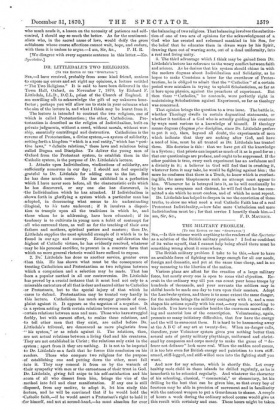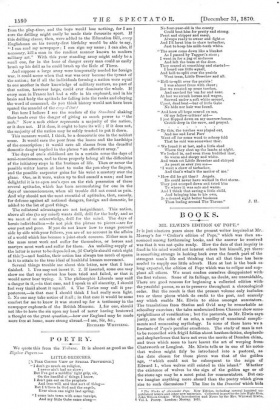THE MILITARY PROBLEM.
70 THE EDITOR OF THE SPECTATOR.")
SIR,—Is this scheme worth anything to the readers of the Spectator as a solution of the British military problem ? I feel so confident of its value myself, that I cannot help being afraid there must be something wrong about it somewhere.
The British military problem I take to be this,—how to have an available force of fighting men large enough for all our needs, foreign and domestic, and yet at the same time cheap, and in no way menacing to the liberties of the nation.
Various plans are afloat for the creation of a large military force, but nearly every one is open to some vital objection. Re- cruit in the ordinary way till you can count your home troops by hundreds of thousands, and your servants the soldiers may in skilful hands be made one day to turn upon their masters. Adopt the Landwehr system, and there is to some extent the same danger, for the uniform brings the military contagion with it, and a man shapes his actions equally with his coat,—very much according to his cloth. You have to consider besides the enormous moral suffer- ing and material loss of the conscription. Volunteering, again, presents so many initiatory difficulties, that few have the energy and the will to surmount them. It is hard to be hammering away at the A B C of any art at twenty-five. When no danger calls, therefore, your Volunteer system gives you nothing better than several sets of pretty military playthings, uniformed and christ- ened by companies and corps merely to make the game of "de- fence not defiance" look more real. When the sudden need comes, it is too late even for British energy and patriotism to turn stiff- armed, stiff-legged, and stiff-willed men into the fighting stuff you want.
And now for my scheme, which is shortly this. Let every healthy male child in these islands be drilled regularly, as he is henceforth to be schooled regularly. And whatever the character of his schooling, classical, "commercial," or elementary, let his drilling be the best that can be given him, so that every boy of fourteen may be able in precision of movement and in familiarity with the national weapon to put a Guardsman to shame. A couple of hours a week during the ordinary school course would give us this result with certainty and ease. These hours might be taken
from the play-time, and the boys would lose nothing, for I am sure the drilling might easily be made their favourite sport. If this drilling clause, then, were added to the Education Bill, every Englishman on his twenty-first birthday would be able to say, "I can read my newspaper ; I can sign my name ; I can also, if necessary, kill a man in the readiest manner known to modern military art." With this your standing army might safely be a small one, for in the hour of danger every man could as easily brush up his drill as he could brush up the Rule of Three.
And suppose a large army were temporarily needed for foreign war, it could never when that war was over become the tyrant of the nation; for if all the individuals forming a nation were equal to one another in their knowledge of military matters, no part of that nation, however large, could ever dominate the whole. If every man in France had had a rifle in his cupboard, and in his brain and body the aptitude for falling into the ranks and obeying the word Of command, do you think history would not have been spared the scandal of the coup d'itat ?
But here I believe I see the readers of the Standard shaking their heads over the danger of giving so much power to "the mob." Now a mob either represents a majority of the nation, or it does not. If it does, it ought to have its will ; if it does not, the majority of the nation may be safely trusted to put it down.
This measure would, I think, be a democratic one in the noblest sense. It would save the poor from the losses and the hardships of the conscription ; it would save all classes from the dreadful domestic danger implied in the phrase "an effective army."
The days of one's childhood are in a certain sense the days of semi-consciousness, and to them properly belong all the difficulties of the initiatory steps in the business of life. Then or never the possible writer learns at least to make the pen obey the fingers, and the possible carpenter gains for his wrist a mastery over the plane. One, as it were, wakes up to find oneself a man; and bow delightful it is to open one's eyes on the rich possession of these several aptitudes, which has been accumulating for one in the days of unconsciousness, when all trouble did not count as pain. And why should not the most essential of aptitudes, that, namely, for defence against all national dangers, foreign and domestic, be added to the list of good things.
The collateral advantages are not insignificant. This nation, above all else (to my mind) wants drill, drill for the body, and as we most of us acknowledge, drill for the mind. The days of heroic individualism—do not pick the phrase to pieces—are for ever past and gone. If you do not know how to range yourself side by side with your fellows, you are of no account in the affairs of a world which has become a joint-stock concern. Either men in the mass must work and suffer for themselves, or heroes and martyrs must work and suffer for them. An unfailing supply of the latter is never to be depended on, (if Carlyle should catch sight of this !)—and besides, their action has always too much of spasm in it to attain to the true ideal of healthful human movement.
Several things trouble me about this letter, now that I have finished. 1. You may not insert it. 2. If inserted, some one may show me that my scheme has been tried and failed, or that it would never bear trying. 3. The philosophic Liberals may sniff a danger in it,—in that case, and I speak in all sincerity, I should feel very timid about it myself. 4. The Tories may call it pre- posterous,—in that case I should think I had really seen light. 5. No one may take notice of it all ; in that case it would be some comfort for me to know it was stored up for a testimony in the newspaper cupboards of the British Museum. I, for one, should not like to have the sin upon my head of never having bestowed a thought on the great question,—how our England may be made more free at home, more strong abroad.—I am, Sir, &c.,
RICHARD WIIITEING.



































 Previous page
Previous page